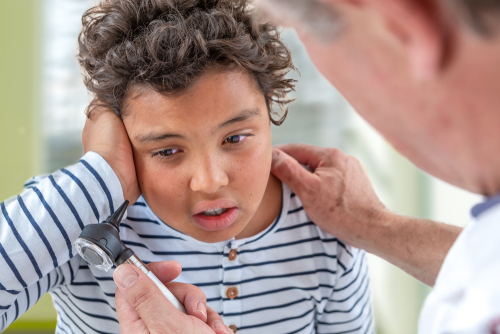Information for Parents
Ear infections are very common in children. Although symptoms usually clear up within 3 days they can last up to 1 week. Symptoms in older children include:
- Pain inside the ear
- A high temperature (above 38C or 100.4F)
- Difficulty hearing
- A feeling of pressure or fullness inside the ear
- Itching and irritation in and around the ear
- Discharge running out of the ear
Babies and younger children may:
- Rub or pull their ear
- Not respond to some sounds
- Be irritable or restless
- Have a reduced appetite
- Lose their balance
What do I need to know?
Ear infections can be categorised into inner or outer infections.
Inner ear infections (otitis media)
These may be caused by a virus or a bacteria. Antibiotics might be prescribed depending on the clinical examination by your doctor.
Outer ear infections (otitis externa)
These infections are caused by irritation to the ear canal. They may be due to conditions like eczema, the presence of water in the ear canal or from wearing ear devices.
Your child may be prescribed:
- Antibiotic eardrops- to treat a bacterial infection
- Steroid eardrops- to bring down swelling
- Antifungal eardrops- to treat a fungal infection
Prevention
Ear infections cannot always be prevented. To help avoid ear infections:
- Make sure your child is up to date with vaccinations
- Keep your child away from smoky environments
- Try not to give your child a dummy after they are 6 months old
- Do not stick cotton buds into the ear
- Use earplugs or a swimming hat when swimming
- Avoid shampoo and water getting into the ears when taking a shower or bath
How do I care for my child with an ear infection?
- Provide regular pain relief to manage pain, fever and inflammation
- Avoid sleeping on the affected ear
- Keep ears clean and dry
- Avoid swimming for 2 weeks
- Avoid shampoo or water getting into the ear when bathing
- Avoid flying
When to be concerned and seek medical attention
- Worsening symptoms
- Fever for longer than five days
- Sudden pain or ear discharge
- Having less than 50% of oral intake or less than 50% of normal urine output
- Swelling behind the ear
Further Information
If you need any more information or advice between the hours of 0800-2000 Monday-Sunday please call The Children’s Urgent Care Centre on 02073906150.
Out of hours please contact NHS 111.
Call NHS 111 if you need medical help fast, but its not life threatening- for example, if you:
- Think you need to go to hospital
- Don’t know who to call for medical help
- Don’t have a GP to call
- Need medical advice or reassurance about what to do next.
In case of emergency please call 999 or attend your local Children’s Emergency Department.
DISCLAIMER
This article is for information only and should not be used for the diagnosis or treatment of medical conditions. Essential Parent has used all reasonable care in compiling the information from leading experts and institutions but makes no warranty as to its accuracy. Consult a doctor or other health care professional for diagnosis and treatment of medical conditions. For details
click here.
